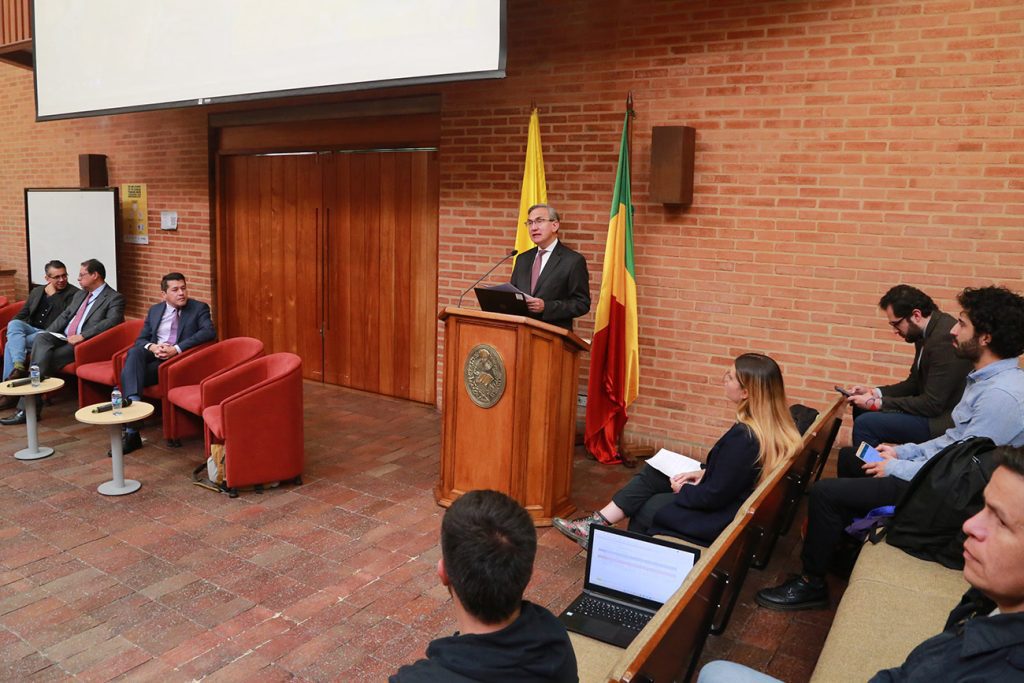On October 27, the rector of the university, Hernando Barra Nieto; Dean of the Faculty of Social Sciences and Humanities Jorge Martinez Cotrina; Director of the Geography Program, Flavio Bladimir Rodriguez; and special guests, they solemnly established the Geographical Days of Reconciliation.
This academic space proposes to reflect, from geography, the factors influencing the problem of conflict, so that the specific variables are analyzed, from a geo-historical perspective, to implement a process of social reconciliation that has direct repercussions throughout the national territory.
“The Conference on Geographical Reconciliation will serve as an ideal academic forum for analyzing how armed conflict has been the result of social and economic inequality and its expression in the regional, urban and rural space of our country,” said the university president.
Along the same lines, the Dean of the Faculty of Social Sciences and Humanities, Jorge Martinez Cotrina, stated that this academic forum will allow us to see how cultural shifts that favor interaction with societies can be generated. He also highlighted that Externado is committed to training professionals on the basis of “human geography”, which is central to understanding the dynamics of “this globalized world that requires significant insights and contributions to transform society”.
Gustavo Marulanda Morales, Director of the Agustín Codazzi Geographical Institute, participated in the fixation law, noting some of the essential elements for the realization of a multi-purpose cadastre: “The cadastre cannot be understood as a mere survey of property information in the state. This goes through other previous essential elements that have a relationship With these issues that unite us today: agronomy, cartography, and effective knowledge of the territory.”
Marulanda made a call to build a series of networks and pathways, in which actors such as the Academy play a very important role: “We have to continue to clarify the relationships between you and the Institute, to generate new and improved practices, and to understand, in an important way, and based on investigation, what is happening in the regions.”
In the framework of the conference, a basic presentation was also made to the Observatory of Regional Inequality and Regional Peace, through an exhibition of graphs, maps and photographs of eight PDET regions, works that will allow the analysis, based on statistical data and measurements in the Gini index, the need for a regional and ecological system that expresses the interests of The fundamental component of the 1991 constitution, as opposed to inequality reinforced by political and economic centralization.
On this second day, forums were also held on topics such as regional planning and environmental planning for peace, which featured the participation of different social actors, including: Maria Jimena Dozan, journalist and director of “A Fondo”. Reverend Alp, peace agreement negotiator; Laura Daniela Cifuentes Quiroga, Peasant Coordinator at Sombaz; Luis Felipe Guzmán, Research Professor at the University of Externado de Colombia; Among other things.
Check the conference agenda over here

“Social media evangelist. Student. Reader. Troublemaker. Typical introvert.”

:quality(85)/cloudfront-us-east-1.images.arcpublishing.com/infobae/TEQF6EONZRFGLLLDIDD4L2O4EE.jpg)

:quality(75)/cloudfront-us-east-1.images.arcpublishing.com/elcomercio/XU32LRAEZFDDPNVHLFU3CKVBYY.jpg)



More Stories
Venezuela ranks fourth in female leadership in science and technology in Latin America
In Portuguesa and Sucre they explore the wonderful world of science
The university court overturns the expulsion of two teachers and a chemical sciences student